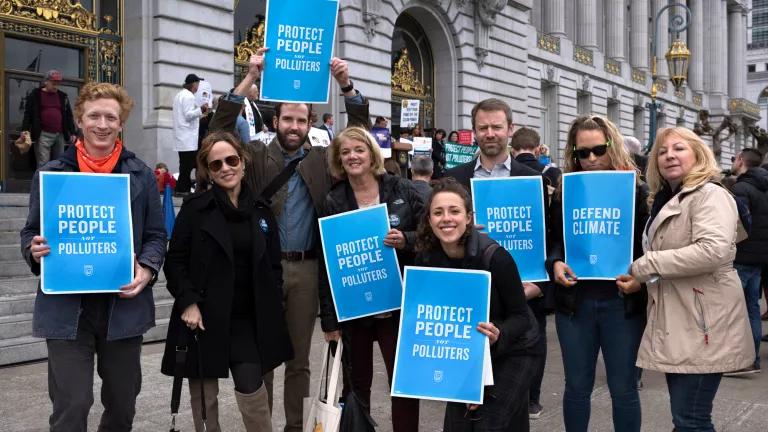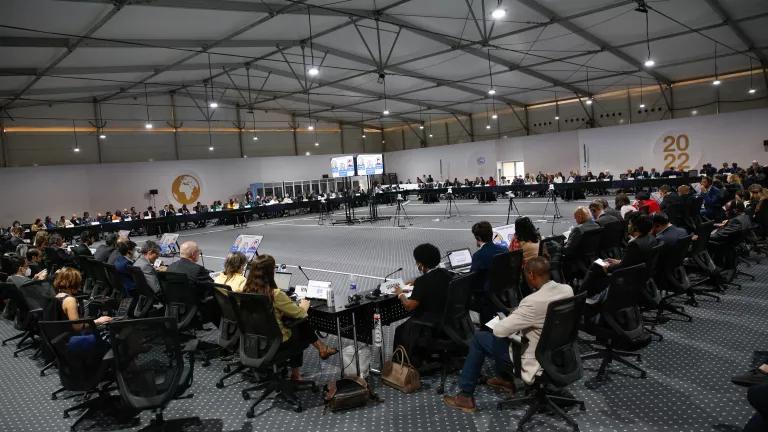Climate Action from Latin America to California
During the Global Climate Action Summit held in California this week, cities, states and companies from around the world, including from Latin America, pledged to take actions that will help implement the Paris Agreement on climate change. As a region that is highly vulnerable to climate change, there is mounting urgency in Latin America to implement solutions like sustainable transportation, climate-smart agriculture and ecosystem protection, and invest in resilient cities and infrastructure. As the Trump Administration has walked back from climate commitments, Latin America has continued to be a region we can look to for positive climate action. Here are just some examples of leadership from Latin America that were highlighted at GCAS. These initiatives to advance on zero emission transportation, deforestation prevention and green finance innovation demonstrate strong commitment from cities, civil society and the private sector are the types of solutions even more municipalities and other non-state actors in Latin America must move toward to in the coming months and years.
Latin American cities and zero emission transportation
Medellín, Colombia was one of 12 new cities, representing over 34 million people, to join the C40 Green & Healthy Streets (Fossil Fuel Free Streets) Declaration. By signing this declaration, city leaders commit to only procure zero-emission buses starting in 2025 and ensure that by 2030, a major part of their city is emissions free. Medellín’s Mayor, Federico Gutiérrez Zuluaga has noted that the Medellín aims, “to become the capital of electric mobility in Latin America to positively impact the welfare of our people.” Indeed, while still a new technology in Colombia, zero emission vehicles are already beginning to circulate in Medellín. Earlier this year, Medellín inaugurated its first electric bus and expects to eventually have 220 in operation. The city is also adding 500 electric taxis to its transportation system this year, a number that is expected to grow to 1,500 by 2020.
Importantly, the actions taken under this agreement will help fight climate change and will also have immediate impacts on local air pollution, improving the health and quality of life of residents. Medellín joined Quito and Mexico City, two other Latin America cities that had previously joined the zero-emissions transportation pledge. Air pollution from transportation in Latin American cities results in millions of early deaths and other health impacts. It is urgent for even more cities in the region to commit to moving toward low emission and zero emission vehicles. Encouragingly, Latin America has a history of pioneering innovative transportation solutions. Colombia, Brazil and Mexico were all early adopters of Bus Rapid Transit Systems. Today, from Chile to Cost Rica and beyond we’re beginning to see cities and countries designing and implementing electric vehicle policies and solutions.
Ending deforestation in Brazil’s Cerrado
In more good news for both the global climate and the environment and people of Latin America, a group of 44 investment institutions that collectively manage US$5.6 trillion in assets joined a coalition of 70 large food corporations in signing a Statement of Support for the 2017 Cerrado Manifesto. The Cerrado Manifesto is an urgent call to action by over 60 Brazilian NGOs for “immediate action in defense of the Cerrado by companies that purchase soy and meat from within the biome, as well as by investors active in these sectors.” The signatories of the Statement of Support commit to working with local and internationals stakeholders to halt deforestation loss in the Cerrado through sustainable land use policies and monitoring and verifications systems.
The Cerrado is an extraordinarily biodiverse savannah that has already lost 88 million hectares, representing roughly 50% of its native vegetation, due to indiscriminate land use change for agricultural expansion. The deforestation in the region is also directly aggravating a water crisis the region. Halting the expansion of the agricultural frontier with common sense sustainable land use practices is yet another example of how actions to stabilize the global climate will also have direct benefits for local communities.
Mexico City commits to green bonds
The growth of the green bonds market worldwide is another example of how the private sector and financial institutions are increasingly playing a role in the fight against climate change—indeed an essential role. GCAS saw the launch of a new Global Green Bonds Partnership that will help provide technical assistance and capacity building to support subnational entities and corporations accelerate the issuance of green bonds.
Meanwhile, Mexico City became the first Latin America city to sign the Green Bonds Pledge—with 9 million people it is also the largest city anywhere to do so. The Green Bonds Pledge is an initiative that aims to spur municipalities, public leaders and corporation increase the use green bonds to finance low carbon and climate resilient infrastructure. José Ramon Amieva Gálvez, the Head of the Mexico City Government noted that “one of the main challenges to accelerate climate action at the local level is access to international funding sources for city-scale mitigation projects. A signatory of the Green Bond Pledge, CDMX supports the rapid growth of a local green bond market and will strive to issue, when appropriate, green bonds to finance infrastructure, mitigation and climate resilience projects.”
Mexico is in fact already a leader on green bonds in Latin America. Several green bonds and sustainable bonds have been issued in the country in recent years by national development banks, private corporations and Mexico City, which in 2016 became the first Latin America city to do so. In total these bonds have raised approximately US$5.2 billion. The Mexican Stock Exchange, in partnership with the group MexiCO2, was a key driver of the growth of this new market. Now other stock exchanges in Latin America, such as Chile and Peru are following suit.
These, and other green finance initiatives in Latin America such as NRDC’s green bank work in the region come not a moment too soon. According to the International Finance Corporation, by 2030 Latin America will need to invest over US$ 2.6 trillion, or US$176 billion per year, in clean energy and urban infrastructure such as buildings, waste and transportation in order to meet commitments under the Paris agreement by 2030.
To achieve this, it will be necessary for Latin America to develop innovative green finance tools and approaches that can help quickly ramp up private investment in climate solutions. The firm commitment with ambitious climate action of cities and other non-state actions, such as what we saw at GCAS, will be another key ingredient.




